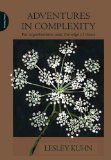
 |
|
Book
|
Adventures in Complexity by Lesley KuhnFor Organisations Near the Edge of Chaos (Jun 2009) |
|
|
|

 A complexity approach removes simplistic hopes of an ordered and controllable existence where, if only we had the right ‘keys’ or ‘tools’, we would be able to fashion a successful organisation. Instead, it offers a way to identify underlying patterns of order and indicators for influencing future sustainable practice; it shows how simple recurrent rules result in complex behaviour and that ‘influential interventions’ do not take a neat cause-and-effect path but may generate unexpected outcomes.
A complexity approach removes simplistic hopes of an ordered and controllable existence where, if only we had the right ‘keys’ or ‘tools’, we would be able to fashion a successful organisation. Instead, it offers a way to identify underlying patterns of order and indicators for influencing future sustainable practice; it shows how simple recurrent rules result in complex behaviour and that ‘influential interventions’ do not take a neat cause-and-effect path but may generate unexpected outcomes.
The focus of Adventures in Complexity is not so much organisations as the ‘life of organisations’. Author Lesley Kuhn sees organisations as ‘collectives of human activity’ and here describes how complexity theory can be applied in and to organisations. Complexity theory acknowledges that people are self-organising, dynamic and emergent beings who are capable of discerning thoughtfulness and innovative responses to change both within and between organisations. It argues that sustainability is best served by tapping into this entire pool of potential.It embraces uncertainty and change. It uses terms like non-equilibrium and turbulence to show that, when systems reach ‘the edge of chaos’, they are most likely to exhibit creative, innovative responses and new patterns and structures are most likely to emerge. In the current unpredictable climate many organisations may consider themselves 'near the edge of chaos'. Yet most will not realise that this is where the greatest potential for success lies. Lesley Kuhn here introduces the principles of complexity theory in a clear and accessible way through discussion of those concepts and metaphors that are most useful in understanding organisational life. This provides a foundation from which to apply these principles to organisations and much of the book is dedicated to complexity in practice.Seven case studies, from a not-for-profit to a large pharmaceutical company, examine this sophisticated way of thinking and the application of key complexity metaphors.
For leaders, managers, and everyone who works in or for an organisation, the book offers a straight-forward and immediately practical way of applying what may seem like a complicated theory. For academics, researchers and students who may be theorising in a vacuum, the book shows how complexity theory can be translated into the workplace.ABOUT THE AUTHOR Lesley Kuhn is Senior Lecturer in the College of Business at the University of Western Sydney, Australia. For 14 years prior to this she worked at the Social Ecology Centre, an innovative post-graduate oriented transdisciplinary Centre that brought an integral perspective on the self, nature and society and has been active in bringing complexity habits of thought to philosophical and social inquiry and in developing complexity informed ethnographic research approaches.She is author of more than 40 book chapters and published papers and has led more than 30 research projects as well as being the Guest Editor for special double issue of the prestigious Journal, World Futures: The Journal of General Evolution, that was dedicated to showcasing the work of UWS academics in bringing complexity informed approaches to social inquiry. She is a master of transdisciplinary thinking, with degrees in music, education and environmental science and a doctorate in philosophy. Her hopes are for a tolerant, democratic and egalitarian society where people are aware of how they are structured and categorised by social and cultural dictates, ideologies and the declarations of those who think they have a monopoly on what is right and should be known. She is passionate about protecting and promoting flexibility and freedom of mind and soul along with a capacity for trust, wonder and hope.
Book For Organisations Near the Edge of Chaos
|
|
10:23 AM GMT |